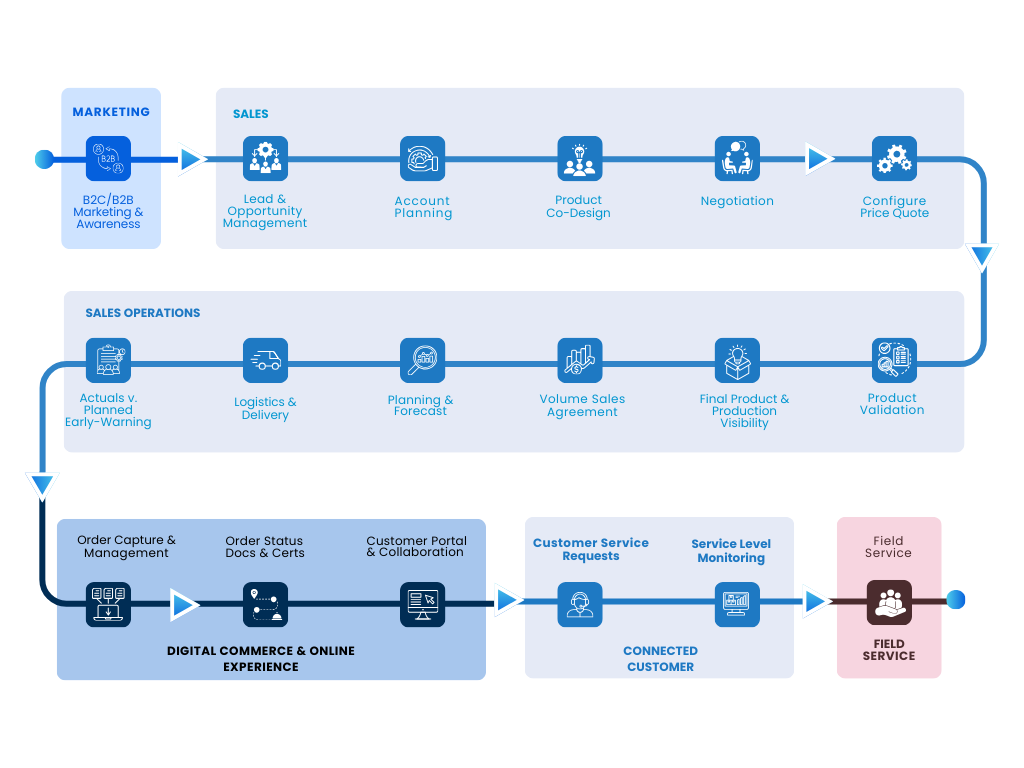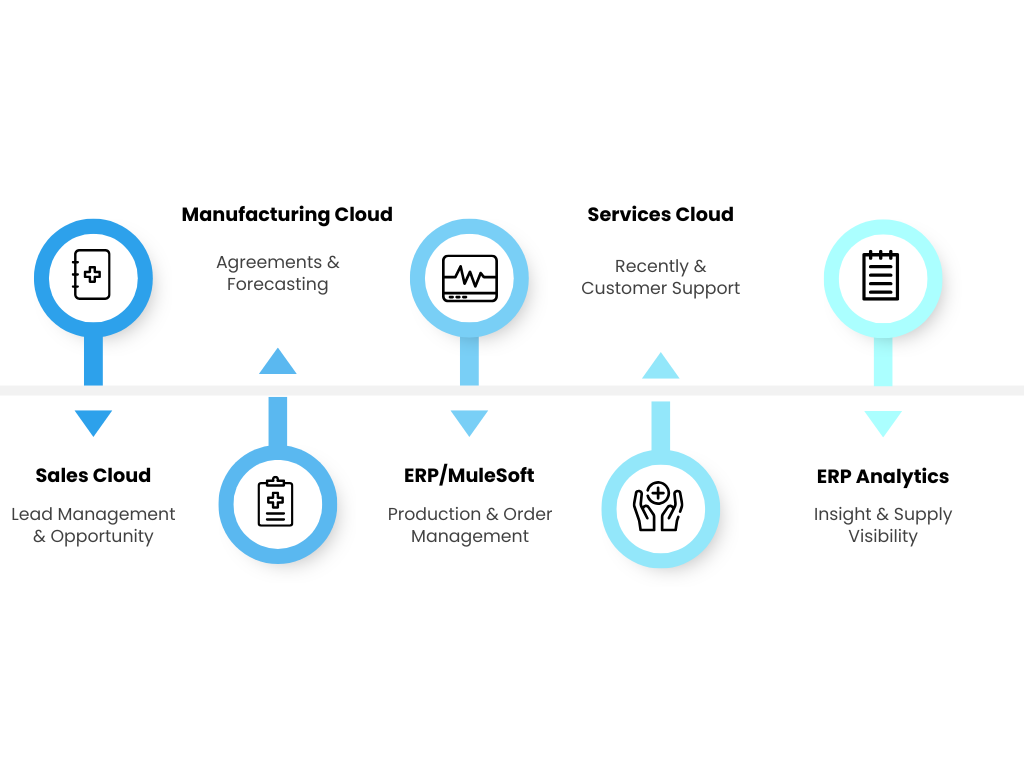Manufacturing businesses are continually seeking ways to operate faster, smarter, and more efficiently. With unpredictable supply chains, rising customer expectations, and relentless competition, staying ahead requires more than just high-quality equipment and a skilled workforce. Manufacturers require technology that integrates sales, service, and operations into a single, seamless system.
Salesforce provides this competitive edge with its connected operations platform. Far more than just a CRM, Salesforce provides a 360-degree view of the manufacturing value chain, enabling companies to improve forecasting, streamline workflows, and strengthen customer and partner relationships. With Salesforce Manufacturing Cloud, manufacturers can simplify processes, respond to customer queries faster, and make confident decisions based on accurate, real-time data.
What Salesforce Offers to Manufacturers
From siloed systems to ever-growing customer expectations, manufacturers face daily challenges that slow down progress. Customer data sits in silos, processes are often manual, and sales teams lose time on repetitive tasks instead of focusing on growth. On top of this, there is always pressure to deliver faster and provide a better customer experience.
Salesforce helps solve these issues by providing manufacturers with tools to manage efficiency and customer relationships:
Break down silos between sales, service, and the supply chain
Automate repetitive processes like follow-up emails, service bookings, or inventory updates
Gain real-time visibility into performance with reporting and analytics
Deliver better after-sales support and warranty management
For many manufacturers, Salesforce has become a hub for smart operations — connecting teams, streamlining processes, and driving data-driven decisions.

Industry Use Cases of Salesforce Manufacturing Cloud
Salesforce is already reshaping the way leading manufacturers manage customers, sales, and operations. Here are a few examples:
Ford used Salesforce to unify data across sales, service, and financing teams. With dynamic dashboards and real-time updates, they boosted email click-through rates by 48% and kept customers informed about order status through email and SMS.
A global home appliance manufacturer turned to Salesforce to deliver more personalized service. By using the Service Console, call handling times dropped by 12%, while field technicians planned maintenance more efficiently and even guided customers remotely through Visual Remote Assistant.
Pirelli adopted Salesforce for smarter demand forecasting and dealer engagement. Sales reps now use historical data to give order recommendations, while dealers manage restocking and promotions through a self-service portal. This helped the company achieve an 8% increase in B2B engagements with dealerships.

Salesforce Functionality for Manufacturers
Alongside Manufacturing Cloud, manufacturers can also take advantage of Salesforce’s standard products. They can easily be mixed with Manufacturing Cloud licenses. With the right setup and customization, these tools support industry-specific goals just as effectively.
Salesforce Marketing Cloud
Helps manufacturers run targeted campaigns, track customer journeys, and build stronger brand loyalty. It is especially useful for keeping distributors and end customers engaged with personalized content.Salesforce Sales Cloud
Supports sales teams with lead management, opportunity tracking, and pipeline visibility. For manufacturers, this means better forecasting and the ability to close deals faster by having all customer information in one place.Salesforce Service Cloud
Equips service teams with tools to handle cases, manage customer interactions, and provide consistent support. Manufacturers can use it to improve after-sales service, strengthen customer trust, and build long-term relationships.
Capabilities of Salesforce Manufacturing Cloud
Manufacturers can choose Manufacturing Cloud for Sales, for Service, or both, depending on their needs. On top of that, Flow for Manufacturing is included in every plan, and there are add-on tools that can be licensed separately. The pricing is flexible, but the real value lies in what the platform delivers.
Let’s break down manufacturing for both sales and service cloud.
Salesforce Manufacturing Cloud for Sales
Manufacturing Cloud gives sales teams the tools to manage agreements, forecast demand, and keep closer connections with partners and customers.
Sales Agreements
Sales teams can create, edit, and renew agreements that define terms like product categories, pricing, and delivery schedules.Advanced Account Forecasting
Instead of guessing future demand, data from orders, opportunities, and agreements is processed to predict revenue and quantities for upcoming periods.Program-Based Business
Plan for complex production programs in industries like automotive or aerospace.Cloud Sites for Manufacturing
Branded self-service portals for warranty claims, shipment tracking, and rebates.Account Manager Targets
Define clear sales goals by account, product, or revenue.Partner Visit Management
Sales managers can plan visits to distributors or channel partners with a better structure.
Salesforce Manufacturing Cloud for Service
With Manufacturing Cloud for Service, companies get tools that help customer service teams, technicians, and managers handle service requests with speed and accuracy.
Service Console for Manufacturing
Customer service reps get a unified console where they can see the full history of customer interactions. One dashboard for all customers, warranty, and asset interactions.Warranty Lifecycle Management
Manufacturing Cloud helps define warranty terms like coverage and eligibility, process claims from partners or distributors, and track related costs. Automation makes it easier to investigate and close warranty claims quickly, saving both time and money.Product and Part Inventory
Service teams can check product and part availability across warehouses, track shipments, and monitor recalls or returns. Real-time stock visibility across warehouses for faster service delivery.
Additional Tools in Manufacturing Cloud
Flow for Manufacturing → Automate complex processes without coding.
Rebate Management → Create rebate programs, calculate payouts, and ensure transparency.
Intelligent Field Service → Optimize technician schedules and access service data on the go.
CRM Analytics for Manufacturing → Identify revenue trends, customer lifetime value, and distributor performance.
MuleSoft Accelerator for Manufacturing → Enable seamless ERP integration for manufacturers by connecting Salesforce with order management and supply chain systems.

How an Implementation Partner Increases the Value of Salesforce Manufacturing Cloud
While Salesforce offers powerful tools out of the box, maximizing its potential requires tailored implementation. Every manufacturer has unique systems, processes, and reporting needs. That’s why working with a trusted Salesforce implementation partner is key.
An experienced partner helps by:
Configuring Salesforce to support industry-specific requirements like 13-period calendars
Automating workflows across sales, service, and supply chain
Integrating with ERP, MES, and financial systems for end-to-end visibility
Enforcing secure access controls and data protection
Scaling the platform to support future growth
Use Case – Smarter Lead Management with Salesforce
Stridely Solutions recently partnered with a leading manufacturer and distributor of building equipment to implement a Salesforce-based lead scoring and segmentation solution. The project helped the client reduce redundant targeting, improve lead prioritization, and increase conversion rates by using machine learning with Salesforce. It gave their marketing teams sharper insights and stronger ROI from campaigns.
Read Full Success Story – Driving Higher Conversion with Salesforce
Transform Manufacturing with Salesforce and Stridely Solutions
Today’s manufacturers need tools that unify sales, service, and marketing — while delivering deep insights into operations and customer behavior. Salesforce makes that possible by connecting teams and systems in a single, integrated platform.
At Stridely Solutions, we help manufacturers tailor and optimize Salesforce to meet their unique goals. Whether you’re looking to improve forecasting, automate service, or connect systems across your supply chain, we can help.
Contact us today to learn how Salesforce can power your smart manufacturing journey.


